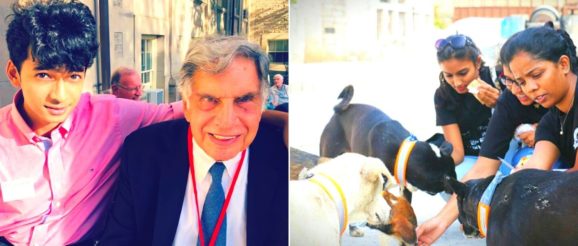Pune Man’s Innovation for Stray Dogs Impressed Ratan Tata, Got Him a Dream Job!

On his way home from a night shift one day, a weary Shantanu Naidu was rattled to see a dog being run over by a car, in the middle of Pune’s Viman Nagar Road. Unfortunately, he saw this happen again. And again.
“It was horrible and would happen frequently. The cars would even run over their carcasses. The most I could do at the time was drag the carcass to the side of the road,” says Naidu, in a conversation with The Better India.
Packed with the goodness of chicken and herbs like parsley, mint, and thyme, this is a snack your doggo will love!
Unwilling to remain a bystander, the young automotive design engineer working his first job for the TATA Group in 2014, decided to take notes from motorists who had accidentally run over dogs or encountered near misses.
For them, visibility and proximity were crucial issues, recalls Naidu. If commuters saw a dog just five seconds before their cars approached them, there was little they could do. These dogs had to been seen at some distance.
Naidu had a ready solution. “Since I was an automotive design engineer, I had access to reflective tapes that you use on cars. I got a couple of friends together to help me design the prototype of a dog collar with reflective tape that would allow that” he says.
However, he was working at an entry-level job, and his friends were college students. None of them had enough money to buy vast amounts of the base material they would use for the collar. They had to get material that was cheap or free.

The answer? Denim!
Practically everyone these days has an item of denim clothing lying unworn in their closets. So, Shantanu and his friends sourced some, built prototypes, and realised that this could work. Towards the end of 2014, they started a denim donation campaign.
“A lot of people came forward to donate, and we used them to make the first batch of 500 collars. Following this, we decided to launch an awareness campaign with assistance from motorcycle riding groups in the city, where we all went about collaring these dogs. A few days later, we received wonderful feedback about how these collars helped them detect dogs at a distance, which truly validated our work,” he recalls.
The campaign picked up steam, and that’s when Naidu and his friends decided to pursue it further. By that time, however, the reflectives they used in their collars began to break because they are only meant for flat surfaces.
“So, we decided to evolve the design. After much research, we began using industrial-grade retro reflectives on our collars which we began stitching onto the denim. This model has sustained us ever since,” adds Naidu.

For the love of dogs
By May 2015, Naidu and his friends had established ‘Motopaws,’ an animal welfare NGO dedicated to dogs, particularly strays. As the months passed, demand for these collars had also picked up, but Naidu and his friends didn’t have any funding.
Searching for solutions, Naidu’s father advised him to write a letter to noted industrialist Ratan Tata, who famously loves dogs.
So, Naidu wrote a heartfelt, handwritten letter to the industrialist and two months later, there was a reply from the big man himself. He expressed his love for the work Naidu and his friends were doing and wanted to meet him.
“I met Mr Ratan Tata for the first time at the end of 2015. My thoughts were swirling, but he put me at ease. He is a generous and empathetic person, and we connected on our shared love for people and animals. Also, he loves working with young entrepreneurs, so everything just came together,” he says.
Today, the NGO has expanded to 11 cities and three countries (India, Nepal and Malaysia) thanks to the generous funding it received from Ratan Tata. There is a Motopaws chapter in each of the 11 cities, and the volunteers go out collaring dogs every day.

A once-in-a-lifetime opportunity
In 2016, Naidu left for Cornell University to pursue his MBA. He had made this decision before the meeting, and conveyed this information to Tata, adding that he wanted to work for the Tata Trust once he returned.
As soon as he came back to India, Tata gave him a call and said ‘I have a lot of work to be done in my office. Would you like to be my assistant?’
“It’s been 18 months since I’ve been working for him, while also running Moto Paws. Last week, we decided to upgrade the design—we won’t use denim anymore. Instead, we will employ super light industrial fluorescent orange, which is completely water-resistant. Even the retro reflectives have been upgraded. On 1 December, we are launching a new model of the collar, which will also have a new buckling mechanism to ensure they aren’t removed easily,” he says.

The way forward
Today, Moto Paws make 1000-1500 dog collars per month but want to raise that figure. “We started this venture for altruistic reasons, and not to make money or profits. We have always given away the collars away for free, and charge the cost price, only if an NGO or an animal welfare group seeks a large order of collars. But this has only happened twice. Nonetheless, there is a growing demand, and given that there are on an average 60,000-1,00,000 lakh dogs per metro city in India, we may have to start selling them,” claims Naidu.

Going beyond collaring, Moto Paws is also collaborating with other animal rescue NGOs who are training volunteers to become rescuers themselves and understand the basics.
What began as a simple act of kindness has now morphed into a movement that is saving the lives of thousands of dogs. How wonderful is it that?
(You can follow Motopaws on their Facebook page)
(Edited by Gayatri Mishra)
